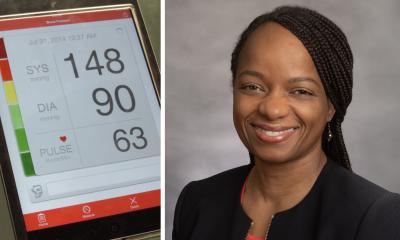
Image source: Shutterstock/wavebreakmedia
News • Intentional rounding
Nurses' hourly ward rounds? There might be better ways to deliver care
A new report by researchers at King’s College London has found that the widespread practice of routine ward rounds in England, known as intentional rounding, may not be the best way for nurses to deliver care to patients.
A new report by researchers at King’s College London has found that the widespread practice of routine ward rounds in England, known as intentional rounding, may not be the best way for nurses to deliver care to patients. The report, which was published in the journal Health Services and Delivery Research, also found that intentional rounding makes a minor contribution, if at all, to the way nurses engage with patients. The research was commissioned and funded by the National Institute for Health Research (NIHR) and was led by Professor Ruth Harris in the Florence Nightingale Faculty of Nursing, Midwifery & Palliative Care.
Intentional rounding is a protocol of standard regular checks with individual patients at set intervals and was introduced in hospitals in England in 2013 as part of the government’s response to care failures in the NHS, most notably at Mid-Staffordshire NHS Trust. In 2014 the NIHR commissioned a report to investigate the impact of intentional rounding in hospital wards on the organisation, delivery and experience of care.
The NIHR report is the first study of its kind in the world. A theory-informed, large-scale mixed method national study of IR and the findings have international relevance. The approach of IR originated in the US and has more recently been implemented in Canada and Australia. Research found that in England, the practice of intentional rounding is widespread, with 97% of NHS acute Trusts in England implementing it in some way. Researchers also identified Eight theoretical explanations of how intentional rounding was thought to work, but only two of these were supported by researchers findings from their national survey and case studies (a review of this evidence was published in the BMJ Quality & Safety ahead of this final report).
Challenging the 'tick box' mentality
Checking patients regularly to make sure that they are OK is really important but intentional rounding tends to prompt nurses to focus on completion of the rounding documentation rather than on the relational aspects of care delivery
Ruth Harris
Most NHS trusts in England adapted the intentional rounding protocol to include additional clinical components of care. This demonstrated that the protocol developed in the US – the ‘4Ps’ (Position, Pain, Personal needs, Placement of items) – is not enough to support the delivery of fundamental nursing care the English healthcare context. The evidence suggested that intentional rounding places emphasis on transactional ‘tick box’ care delivery, rather than individualised care. However patients were found to value the more relational elements of their interactions with nursing staff, which occurred when nurses delivered other care activities and not intentional rounding.
"Checking patients regularly to make sure that they are OK is really important but intentional rounding tends to prompt nurses to focus on completion of the rounding documentation rather than on the relational aspects of care delivery. Few frontline nursing staff or senior nursing staff felt intentional rounding improved either the quality or the frequency of their interactions with patients and their family", says Ruth Harris, Professor of Health Care for Older Adults
The report also found that intentional rounding was implemented without consultation, careful planning and piloting in the interests of political expediency following the Francis Inquiry Report into care failures in the NHS. Whilst the practice was found to provide nursing staff with a safety net against allegations of poor practice, as it provides evidence of care delivery, the report recommends caution when considering the implementation of interventions from healthcare systems in other countries.
Source: King’s College London
09.10.2019










